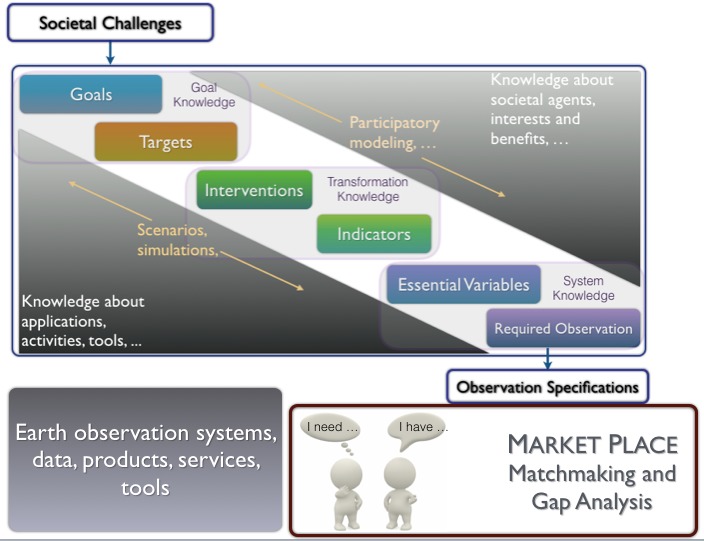Implementing and Monitoring the Sustainable Development Goals in the Caribbean: The Role of the Ocean
Workshop Approach and Format
Design Basis
The workshop utilized a design-based approach to participatory modeling, which starts with a community agreement on the challenges and the goals that are to be reached, and identifies the knowledge needed to make progress toward these goals. Agreeing on specific targets to reach and indicators to measure progress provides a basis for identifying those social, economic and environmental variables that need to be monitored. For these variables, requirements for the monitoring can be specified, and these requirements can then be matched with existing observations and data products. In cases where a matching is not possible, gaps can be identified. The workshop program also acknowledge the fact that there is no simple answer to question of what data are needed and useful. Those engaged in societal efforts often don't know what data would help them, and those collecting data often don't know what the data could be used for in society.
Consistent with this approach, the first three sessions introduced the view of key stakeholder sectors (governments, scientific experts, earth observation providers) on the challenge of implementing the 2030 Agenda, the approaches taking in different SIDS, and the interdependencies of the large set of goals, targets and indicators. A fieldtrip during the first day connected the SDGs to local real-world problems. The next three sessions were intended to progress through the identification of the variables, the specification of observational requirements, and the matching of these requirements to available products. The final session provided a summary and an outlook on next steps.
 |
The workshop program was informed by a design-based approach to participatory modeling developed by Plag et al. (2016). The goal-based approach to the identification of essential variables starts from agreed-upon societal goals and targets (goal knowledge) and utilizes system knowledge to identify those system variables that are essential for the development and validation of the transformation knowledge required to make progress toward the targets. Observational requirements for these essential variables are a crucial input for the matching of these requirements to existing products, as well as the detection of gaps where a match is not possible. The opening session and the first two subsequent sessions focussed on creating a joint understanding of the challenges as well as the goals and targets (goal knowledge). Session 3 was intended to identify a subset of essential variables for both the development of policies to achieve the targets and to quantify the indicators (transition knowledge}. The intended outcome of Session 4 was a set of observational requirements that could either be matched in Session 5 to existing products or identified as gaps (system knowledge). From Plag et al. (2018). |
Format
Within the sessions, presentations of different stakeholders and panel discussions were combined with table discussion rounds and matching group discussions. The presentations provided overviews of efforts made by the different stakeholder groups. The panel discussions combined brief presentations of the panelists and discussions of the panels with the participants. In the two table discussion rounds, the participants split up into five groups discussing table-specific topics. For each round, a round-specific set of questions had been prepared to be considered by each table. The fieldtrip had the goal to introduce the participants to three specific issues related to SDGs, namely the role of private businesses in addressing invasive species such as the lionfish, the role of NGOs in promoting the preservation of ecosystems, including the prevention of plastics and other pollution, and efforts to enable a transition to an organic agriculture.
For each session, the participants were asked to submit so-called 2+2 Forms, in which they were asked to identify two points that under each of two headings. The headings related to the topic of the session and in general asked for what was working and what presented a challenge within the topic of the session (Table "2+2 Questions").
Table "2+2 Questions". Participants were asked to submit 2+2 Forms after each session indicating key points they identified in response to the session-specific questions given in the table.
| Session 0: Opening Session | This is where progress is being made: | These are major challenges: |
| Session 1: The 2030 Agenda for Sustainable Development in Caribbean Small Island States (SIS) | This is where progress is being made in the implementation: | These are major challenges for the implementation: |
| Session 2: Interdependencies and Interactions of SDGs, Targets and Indicators in Caribbean Small Island States | This is where progress is being made in understanding the interactions and interdependencies: | These are major challenges in addressing the interactions and interdependencies: |
| Session 3: Ocean-related variables and indicators essential for SDG implementation and monitoring in Caribbean Small Island States | This is where progress is being made in the identifying the variables and indicators: | These are major challenges for the identification of variables and indicators: |
| Session 4: Observational requirements for ocean-related variables and indicators | This is where progress is being made towards specifying observational requirements: | These are major challenges in specifying observational requirements: |
| Session 5: Matching users, requirements and products | This is where progress is being made in matching stakeholders, requirements and products: | These are major challenges for the matching of stakeholders, requirements and products: |
| Session 6: Improving availability of Earth observations in service of SDG implementation in Caribbean Small Island States | This is where progress is being towards improving availability of Earth observations for stakeholders: | These are major challenges for improving the availability of Earth observations for stakeholders: |
Lessons Learned
In the implementation of the workshop, the participatory modeling approach was incompletely followed through. Participatory modeling necessitates a holistic moderation and facilitation that ensures the inter-linkage between the different parts of the event. Facilitation is normally assigned to an external skilled facilitator. However, the workshop was based on the traditional concept of expert session chairs, which turn out to be less well suited for the participatory modeling approach. For each session, a pair of co-chairs had compiled a program according to a somewhat independent view on their session and given preference to what they wanted to achieve for their session. The tying together of the sessions did not take place to the extent required for participatory modeling. Moreover, in several sessions the majority of the time was allocated to expert presentations, limiting the time stakeholders could develop a joint understanding of their information needs.
The lack of overall moderation of the workshop and skilled facilitation resulted in a deviation of the actual outcomes from those intended and a disconnect between the indiviudal sessions. Moreover, there were insufficient tools for capturing the deliberations constantly and have the outcomes available in electronic form for everybody at the end of each session. In several of the later sessions, participants asked for input that should have been the output of previous sessions, but these outputs were not available.
The experience with the workshop underlines the importance of the approach and at the same time provides amble evidence concerning the necessary implementation. This experience will inform future follow-on partipatory modeling activities.
Recommendations for future activities include continuous engagement with local stakeholders through electronic means in order to collect relevant information to identify priority issues and related information needs. Expert consultations with local stakeholders should include an analysis of information needs and identification of example data sets and products that can meet these needs. Earth observation experts should be consulted to develop specific requirements for data and information such as spatial and temporal resolution. These activities would provide valuable information for in-person participatory modeling events.
This workshop was sponsored by:
 under grant 80NSSC17K0241 |
 |
 |
 |
 |